- Home
- Work
- Painting on Photos.
- Figurations.
- More Drawings.
- Landscapes (2003-05).
- Small Scale Landscapes (2003).
- Squared (2006).
- Reliefs (2007-08).
- Symbols and Diagrams (1991).
- Materic Works (1990).
- Earlier Figurations.
- From Life.
- Black Drawings (1986-89).
- Illustration.
- The City on the Lake.
- Joan Garí Legend.
- Orpheus.
- Bio
- Gallery
- About Some Works
- Links
JOAN GARÍ LEGEND.
The story of Fray Juan Garín, a tradition of Montserrat.
Catalan medieval legend. Montserrat, Barcelona.



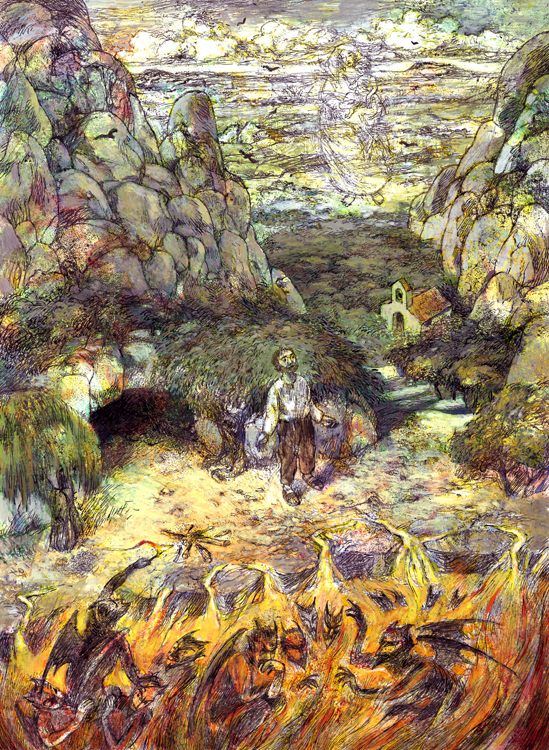

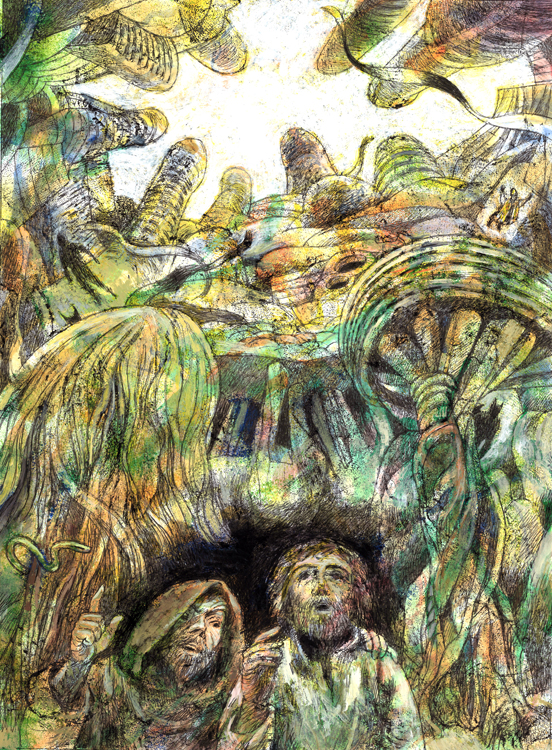

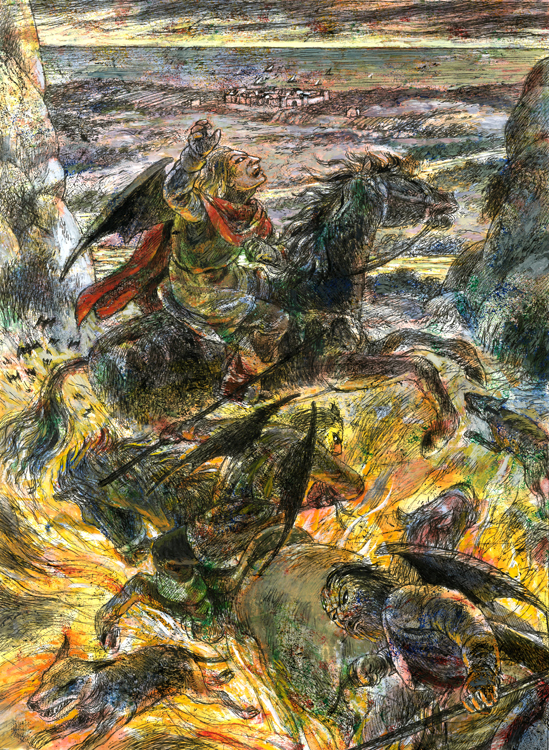

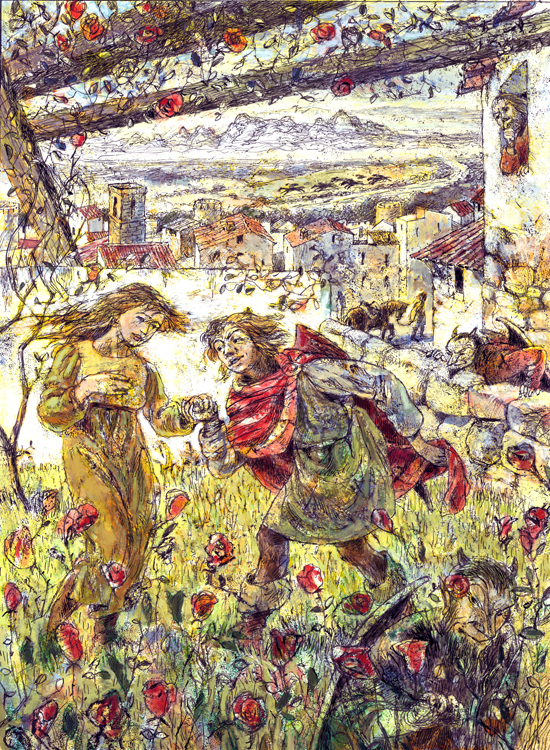

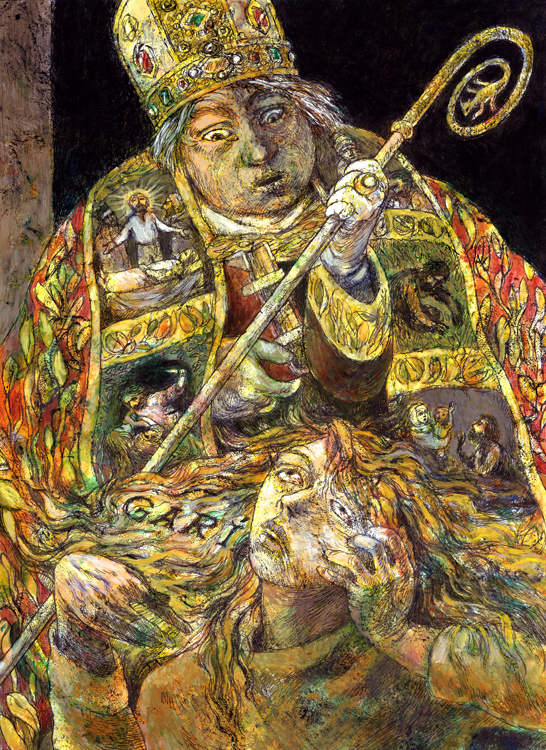

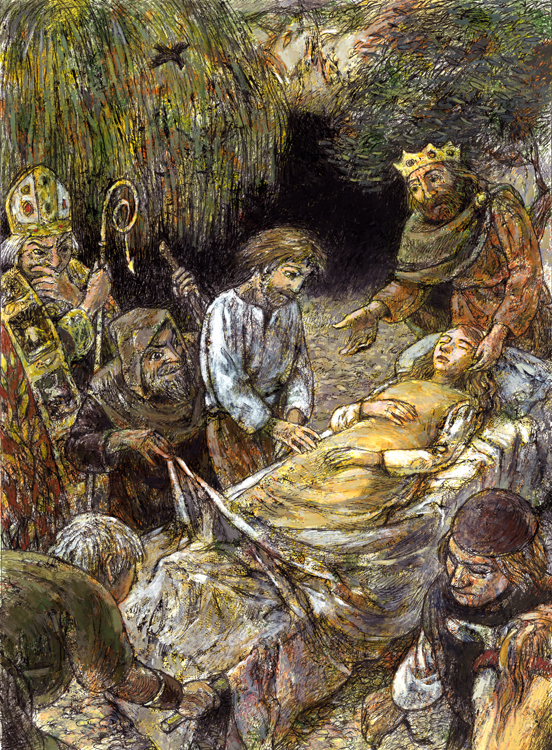

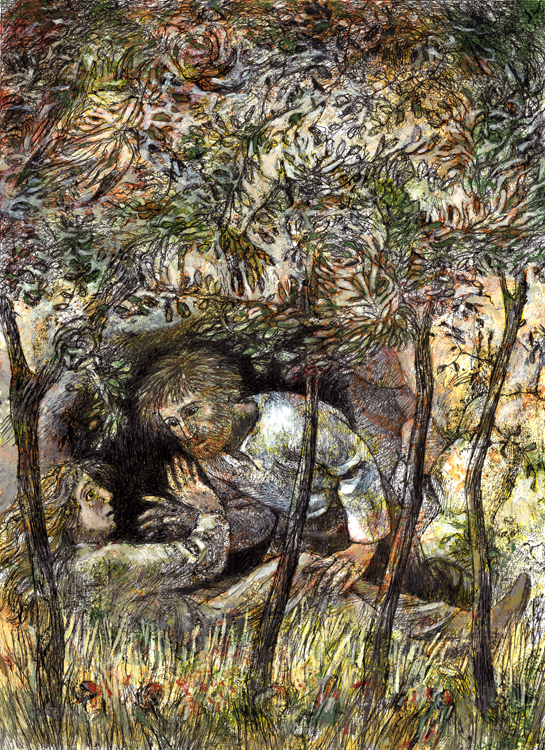

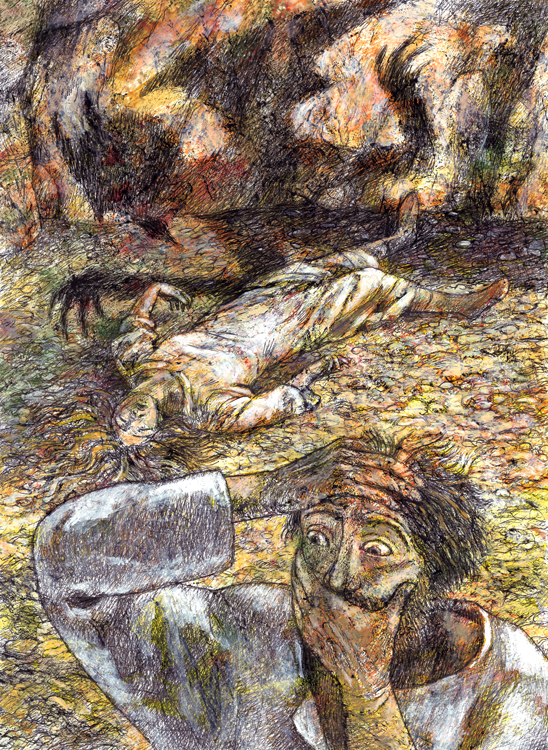

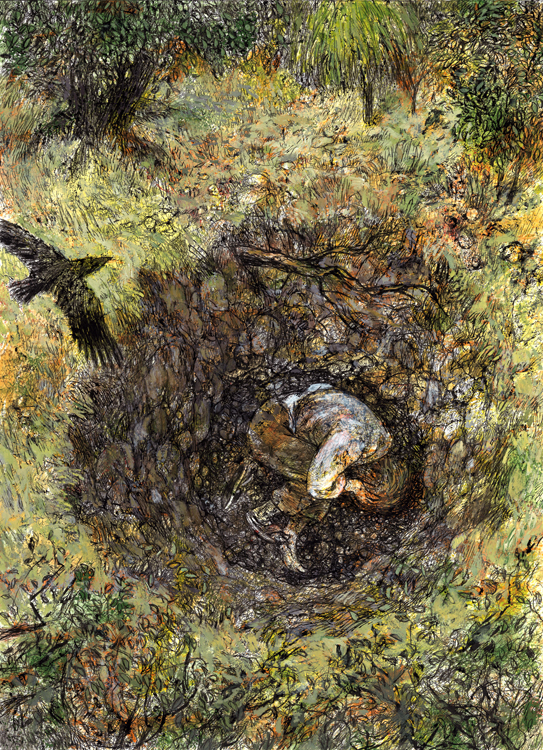

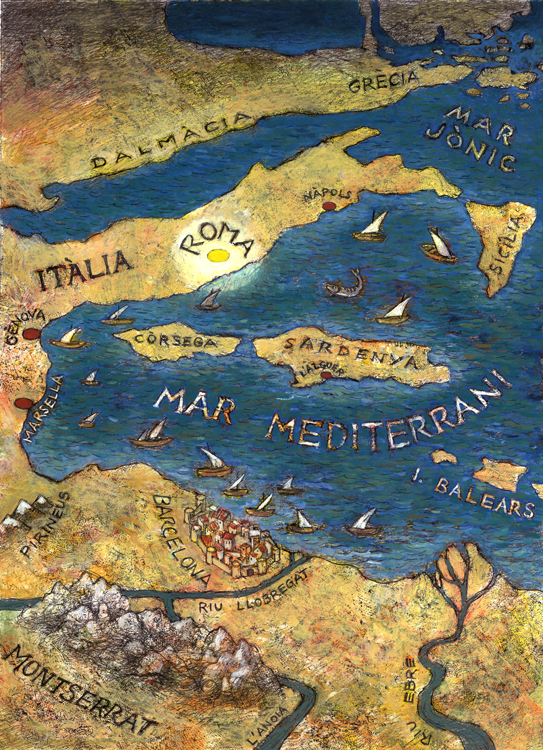

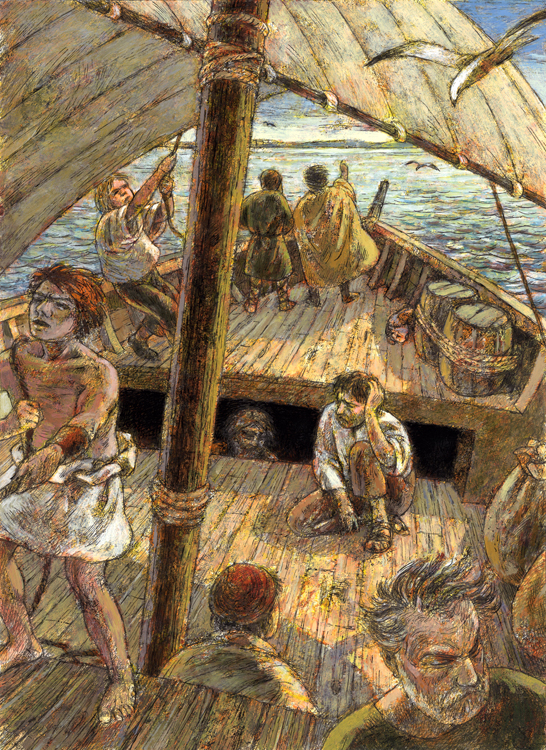

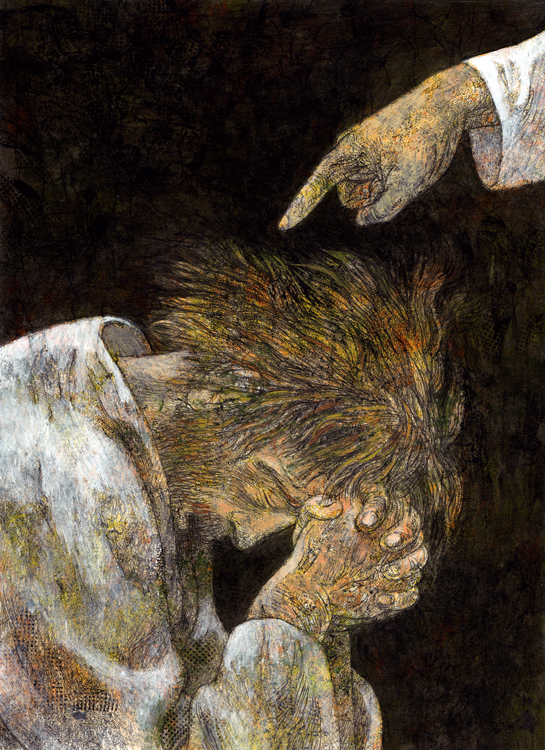

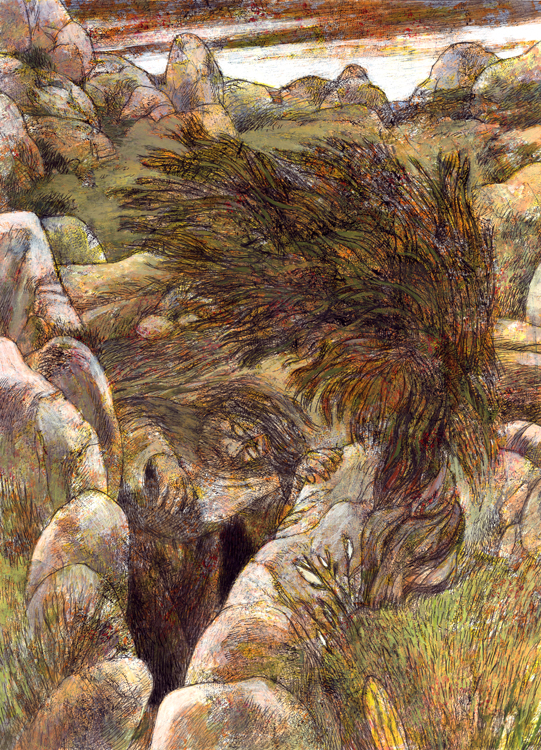

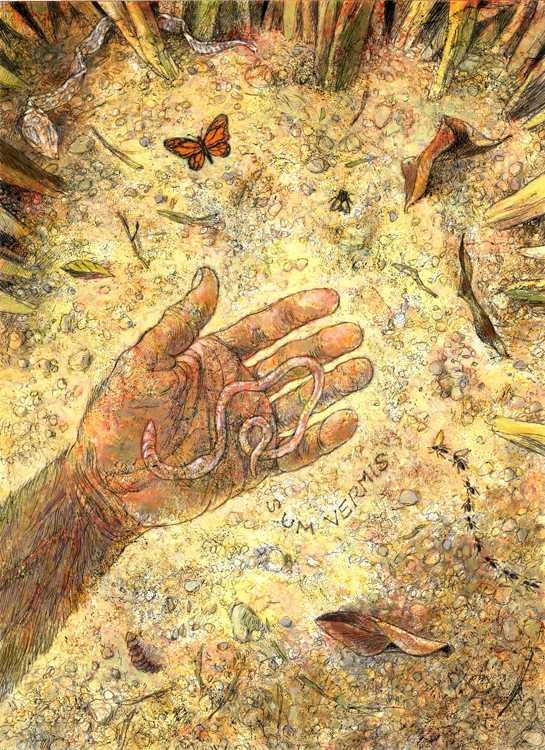

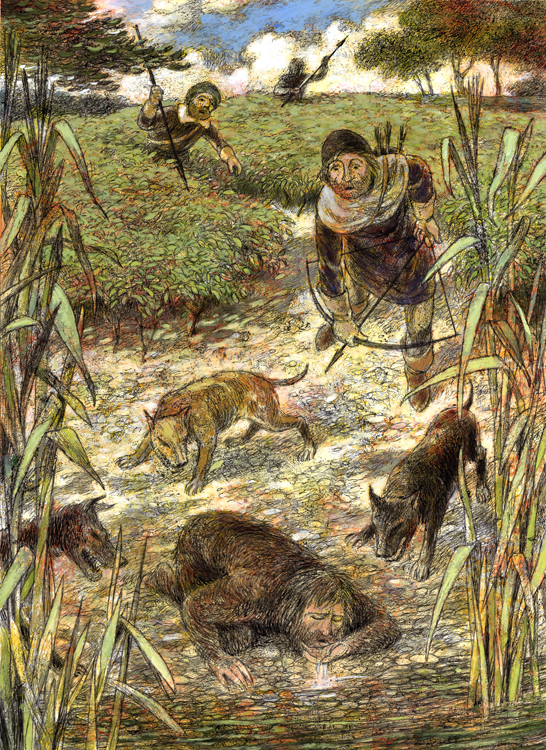

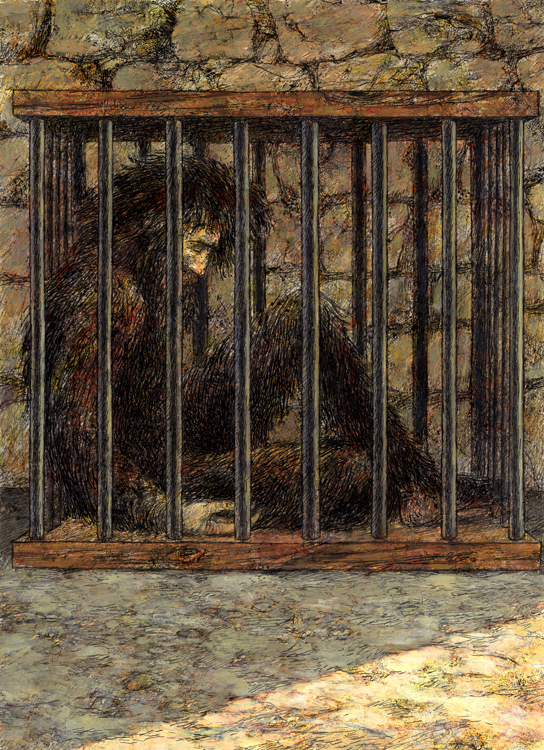

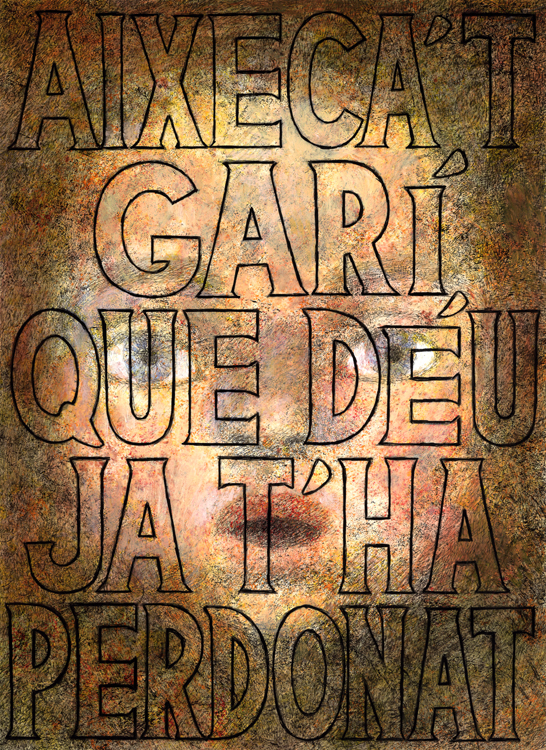

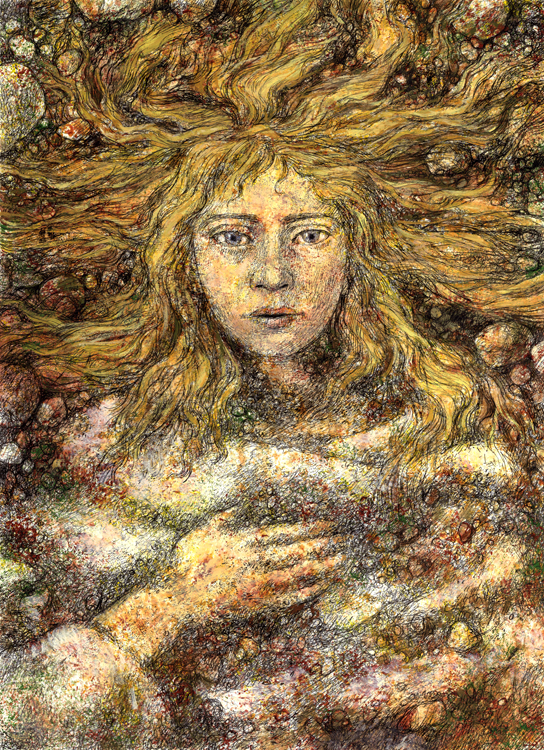

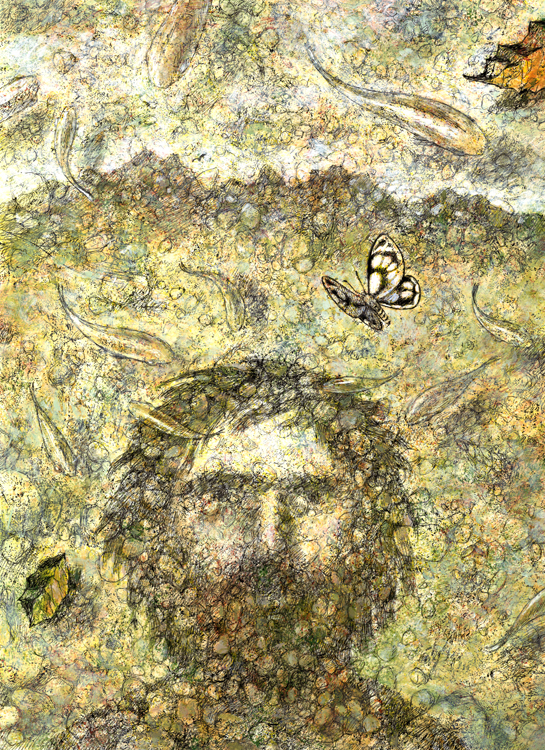


They say that in ancient times there were already hermits up in the mountain of Montserrat. They were holy men who retired to live in one of the many caves hidden among the rocks. They gave up worldly things to devote themselves to spiritual life, and it would seem that some of them could work miracles. This, of course, is what happened long before the monastery was built.
Joan Garí was one of those hermits. He lived in the ninth century, in the times of Count Guifré el Pelós. He was admired by everyone because of his devotion to the Virgin and his virtuous behavior. Apparently, even the bell of the hermitage of Sant Iscle, near the cave where he lived, tolled happily whenever he passed in front. This miraculous fact of soul purity in Garí bugged mainly the lords of hell…
So, dragging down such a valuable soul was quite an appealing challenge for demons who held Council and now we’ll see what they decided.
A devil named Belial was sent to Garí to lead him astray. Disguised as a hermit, he pretended to run into him when going down the mountain. He lied saying he was also living in a cave praying and seemed astonished of knowing him, because of his reputation, he said, was huge and had run all over Christendom. “A holy man like you should be on top of the church and enjoy the authority and privileges he deserves” he added.
To turn on his desire he made Joan see the rough rocks of the mountains as if they were strange constructions in a fantastic and luxurious blend.
But humble Garí, although this vision had somehow blew his mind, he showed himself immune to the greedy temptation that Belial was presenting.
They realized in Hell that they were facing a difficult individual, and therefore they had to change their strategy.
It needed to be played harder, and the Devils conspired into more twisted tactics.
They sent another devil, named Lleonat for the magnificent appearance that he used to take, but as rotten inside and singed as all of his colleagues. It emerged from underground followed by a gang of Devils on horseback, taking the appearance of a group of hunters who went from Montserrat to Barcelona following the river Llobregat.
What dark purpose guided the frantic cavalcade of these spooky characters?
Barcelona was a small town at that time, and the noisy arrival of a group of so flamboyant riders had to be immediately known by everyone. And even more because of being led by a man of such a noble aspect…
Lleonat came immediately near to the Count’s palace and letting himself to be spotted by his daughter, Princess Riquilda. The beautiful presence and refined manners of the stranger seduced the girl. The Count observed the scene as if something was not quite right, but there was already no time for him to intervene when Riquilda let Lleonat embrace her while he now was showing his horns and wings with great laughter seized her soul.
The devil disappeared instantly as if by magic, leaving behind Guifré the good man and the devilish young princess.
All efforts to cure the possessed were in vain. Of course doctors could do nothing, but the priests either, not even the bishop could.
Finally, the devil spoke through Riquilda’s mouth, who began to repeat a name: “Garí, Garí… bring me in with Garí”.
On hearing this, Guifré ordered to leave without delay. When they were in front of Garí’s cave the Count told the hermit what had happened and added: “I beg you, let me leave her with you until her soul remains released.”
Puzzled, Joan hesitated. He said he knew nothing about exorcism. Belial, still in disguissed, repeated in his ear with delight: “What a beautiful girl! Don’t you find her charming? “
“More beautiful than the morning sun and all the stars of the night…” whispered Garí. The devil smiled, perhaps he was the only one he had heard him.
They left the princess with Garí. The demon that possessed he, retired shortly thereafter so not to bother…
Then, it’s really unknown what happened for sure, it could have happend that living together Garí and Riquilda came to truly love one another, or maybe one day he forced her badly. The fact is that the hermit sinned, and immediately went horrified. He was no longer a pure man. How could he fall into sin?
And at that moment, as if the devil were still blowing in his ear, he said: “Yes, it was all because of her!”.
We dare not imagine what happened then: how Garí took away Riquilda’s life, who he considered the cause of his downfall.
In doing so, wanting to repair an error with a more serious one, threw himself fully into the scariest wretchedness.
When having her dead at his feet, he heard a laughter that echoed through the cave. Belial, his false friend and evil adviser, removed the cloak and showed his diabolical silhouette.
Stunned and hopeless, Garí saw himself already in the flames of hell…
He felt sunk into a pit of guilt, as if the earth were sucking him into the abyss. The most reprehensible sin seemed to be the act of a man who knew what the right path was and had always striven to maintain it. In a heartbeat, an innocent man had become the worst of criminals.
What else would he still do, given that he was nothing but a toy for the evil machinations?
He did not expect another destination than the eternal damnation.
But a bit of light reached the depths where he stayed. How about forgiveness? “There can only be a bigger thing than my sin, and it is God’s mercy” stated Joan Gari. Believing that God could not forgive the most miserable of men would be an even greater mistake.
He would travel to Rome to get down on his knees and beg for forgiveness of the Holy Father, whatever the penance he would impose on him.
Sunk, paralyzed by guilt, Garí looked around at people on the move, oblivious to the torment that was consuming him.
In fact, it suited him to go unnoticed, as well as going afar for fear that the Count could send for her daughter and, not finding her, would persecute Garí in order to kill him. He knew he deserved death, but not before obtaining forgiveness.
They were approaching the capital of Christianity. And he seemed to see the light that lit the world from there like a beacon.
The Holy Father received Joan Garí and listened to his confession. “You have committed such a great sin, he said, that you do not deserve to be considered human. Therefore, from now on you will always live rather like a beast, at ground level, eating only things you would find on the ground; not speaking to anyone and not standing ever again nor raising your eyes up to heaven, because you are not worthy of it.
And if God takes pity on you and forgives you, He will let you know so you do not doubt”.
After confessing, it came the atonement. Garí went back to Montserrat again ready to spend all his remaining years of life among weeds and vermins, crawling like a scoundrel. He would live a painful existence that is not considered proper for a human being and he was also sad, nevertheless satisfied to meet a hard penance in line with the wickedness of his acts.
Time went by and Garí strangely adapted to his new environment, to the extent that his initial sadness gave way first to a devoted conformity and then to a type of joy to discover the greatness of the Creator also in this little universe that had within reach of his eyes and hands.
The punishment had become revelation. Would this be its purpose? Had the kindness returned to invade the soul of Joan Garí?
Maybe God is less interested in imposing penalties on the wretched ones who have done wrong than achieving them to be good again…
The thing is that, after a few years, seven they say, some hunters found Garí while he was drinking water in the river, which he used to do with his eyes closed not to see the sky reflected in the water, as ordered by the Holy Father.
They were very surprised. “We have never seen an animal like this” they said. And it was that over time Garí’s clothing had spoiled and his whole body had covered with hair. He had wholly changed to the point that he could not be recognized.
“Let’s bring it to the Count!”. They were very pleased with their finding, and even more to realize the docility of Gari, who did not resist them.
When they arrived at the palace of the Count of Barcelona Garí was left in a cage, like an animal. He accepted it with serenity, seeing in it another episode of penance that was still to be met.
He stayed a few days in this way, but Providence had not abandoned him…
It happened that the count Guifré had another son, Prince Miró, and the day came to baptize him. When the feast started and to amuse the guests, the Count proposed exhibiting that rare animal that had been found in the forest.
They pulled Garí with a leash around his neck. All they marveled. The nursemaid who was carrying the infant in her arms came closer so the boy could see it better and then came the miracle. The little boy addressing the prisoner, spoke these words: “Stand up Garí, God has already forgiven you!”.
Everyone froze. Then Guifré faced Joan Garí and asked angrily: “You, Garí… Where is my daughter? What did you do to her?”. Garí told the sad story and offered his chest to the Count’s dagger, but he stopped and said “I can not punish one whom the Almighty has already forgiven”.
The hermit said the princess was buried near his cave. Guifré left immediately with his men to Montserrat.
When they reached the place Garí told them, they began to dig and remove the earth. They did it with care not to damage Riquilda’s body. They found the body to realize that the girl stayed as beautiful as when she was alive. Her father went to hug her and she opened her eyes. She had returned to life!
In front of this new miracle, all present fell to their knees. Riquilda then proclaimed her desire to retire to a religious life and the noble Guifré offered to build a monastery in the middle of those mountains that she would govern, to accommodate women who also wished to devote their lives to God.
Joan Garí regained his own appearance. He became human again. God had shown to him everywhere: in the forest, among the animals and in front of the whole world, but especially in his own heart. He did not need anything anymore and he would still live many years in peace in his cave of Montserrat.
FOUR MORE LINES
There are several legends like the one we just explained. They are stories about very religious men who fall into sin, undergo a severe penance and are eventually forgiven. Apparently, Joan Gari, or Fray Garin, comes from an earlier legend appeared almost at the beginning of Christianity, which went changing, even being ‘versioned’ by Islam, and went to Montserrat in different ways. Here it found a special echo, mainly because its relation to the origin of the monastery and the country itself: of course, it is not an accident that the action passed in the ninth century, in times of Guifré el Pelós (Wilfred the Hairy).
It was popular for a long time. But, of course, hermits, demons, terrible punishments and miracles survive with difficulty in the modern world…
After all, if we wish traditions still alive, we believe that narrators should take certain liberties. For example, the classic versions just talk of Garí’s penance as a debasing sentence, a punishment that will put him down even more. Instead, we wanted to highlight its regenerative aspect here, presumably because an essentially good man ends up seeing the magnificence of God in all circumstances, and therefore the punishment has already served its purpose and should cease.
Regarding the illustrations style, as we are fully into the medieval world, the choice has been made for a naturalistic figuration, it has seemed appropriate in order to evoke both the faraway atmosphere as the hero’s moral trip.
We will discuss a couple of illustrations.
In order to symbolize the great guilt that Garí has been experiencing, we have represented him at the bottom of kind of a pit. There are two references for this scene. On the one hand, the rocks, near Collbató, in Montserrat, known as Garí’s ‘bed’ and ‘footprint’ that show a concave shape which, according to tradition, were formed by the weight of his shame as he passed by. On the other hand, they say that when Garí had confessed his crime to the Pope, he drew a circle with his cane around him and said: “If the great sin you’ve committed can not be forgiven the earth under your feet will sink to take you to hell”. And we already know that it did not happen because God’s mercy is infinite…
Finally, the tingling proclaiming “Sum vermis” (“I am a worm”) in the image on which the viewers-readers could more easily identify themselves with the main character, since his hand could be theirs, wishes to remind a poem by the Catalan poet Mosen Cinto and Psalm 22.
(See ILLUSTRATION)
- Copyright © 2024. All Rights Reserved

